by Christopher Sherman
JANUARY 2, 2021
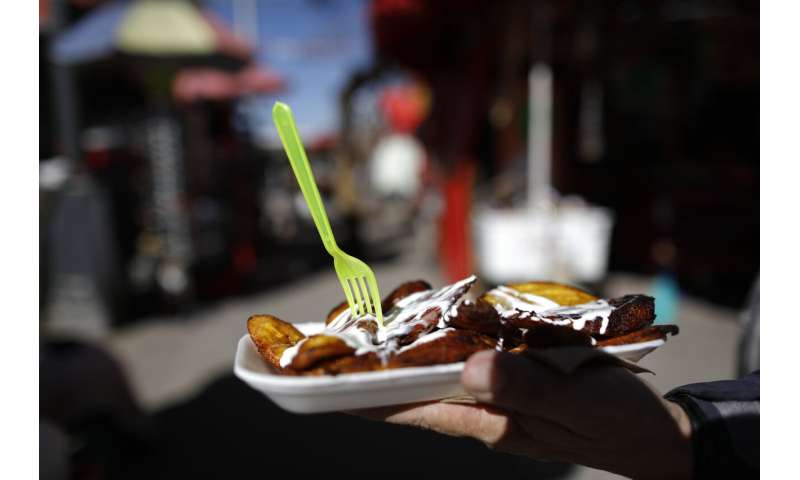

A customer receives his order of fried plantains, served on a non-biodegradable disposable plate along with a plastic fork, from a street vendor in central Mexico City, Friday, Jan. 1, 2021. The few street food vendors out working on New Year's Day amid the COVID-19 pandemic said they were either unaware of or were still figuring out how to comply with a broad ban on single-use containers, forks, straws, and other ubiquitous items that took effect Friday in Mexico's capital, one of the world's largest cities, after more than a year of preparation.
(AP Photo/Rebecca Blackwell)
A broad ban on single-use containers, forks, straws and other ubiquitous items takes effect in Mexico's capital, one of the world's largest cities, after more than a year of preparation.
On Friday, Mexico City's environmental secretary said via Twitter that "from today on Mexico City without single-use plastics." The message urged people to think of always carrying reusable containers like never leaving home without their cell phones.
Mexico City lawmakers passed the ban on plastic bags, utensils and other disposable plastic items in 2019. The city of 9 million people has spent the past year adjusting or in some cases ignoring the impending law change. The ban on plastic bags took effect last year.
Light, allegedly biodegradable bags have become more common at the city's street food stalls. Plastic straws are offered less often. Fresh tortillas are handed over wrapped in paper or cloths that buyers bring with them.
But without the imposition of fines, the change will likely be slow in coming.
On Friday morning, a woman selling tamales under a large umbrella at the corner of a busy Mexico City avenue slid two into a plastic bag and offered two small colorful plastic spoons from a cup filled with them. Asked if she was aware of the ban taking effect she said she was, "but with the coronavirus, they (authorities) forgot about it."
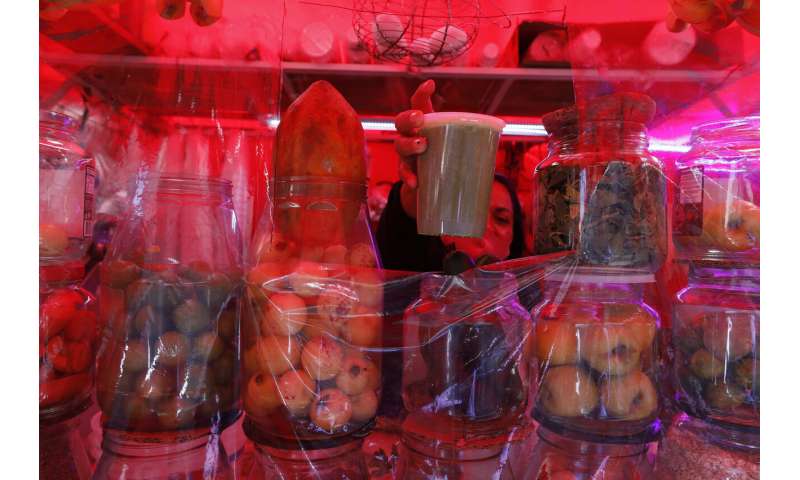
A broad ban on single-use containers, forks, straws and other ubiquitous items takes effect in Mexico's capital, one of the world's largest cities, after more than a year of preparation.
On Friday, Mexico City's environmental secretary said via Twitter that "from today on Mexico City without single-use plastics." The message urged people to think of always carrying reusable containers like never leaving home without their cell phones.
Mexico City lawmakers passed the ban on plastic bags, utensils and other disposable plastic items in 2019. The city of 9 million people has spent the past year adjusting or in some cases ignoring the impending law change. The ban on plastic bags took effect last year.
Light, allegedly biodegradable bags have become more common at the city's street food stalls. Plastic straws are offered less often. Fresh tortillas are handed over wrapped in paper or cloths that buyers bring with them.
But without the imposition of fines, the change will likely be slow in coming.
On Friday morning, a woman selling tamales under a large umbrella at the corner of a busy Mexico City avenue slid two into a plastic bag and offered two small colorful plastic spoons from a cup filled with them. Asked if she was aware of the ban taking effect she said she was, "but with the coronavirus, they (authorities) forgot about it."

A vendor serves up a green juice in a disposable plastic cup, at a street stand in central Mexico City, Friday, Jan. 1, 2021. The few street food vendors out working on New Year's Day amid the COVID-19 pandemic said they were either unaware of or were still figuring out how to comply with a broad ban on single-use containers, forks, straws, and other ubiquitous items that took effect Friday in Mexico's capital, one of the world's largest cities, after more than a year of preparation.(AP Photo/Rebecca Blackwell)
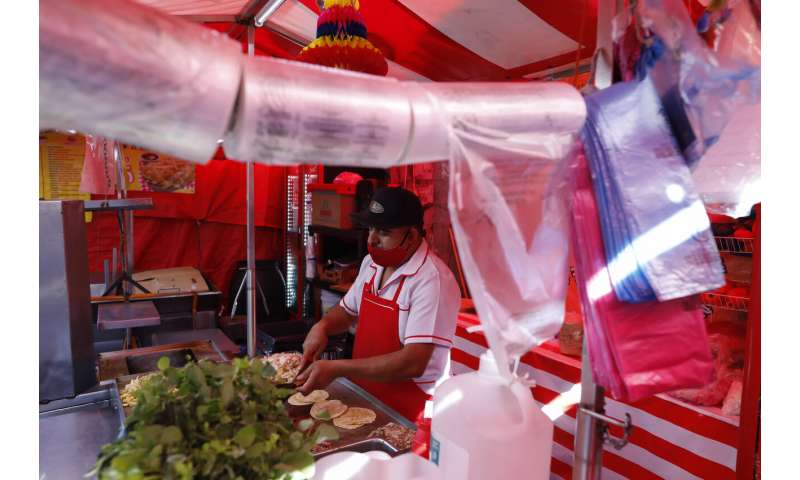
Biodegradable plastic bags, in compliance with a 2020 plastic bag ban, hang at a taco stand in central Mexico City, Friday, Jan. 1, 2021. The few street food vendors out working on New Year's Day amid the COVID-19 pandemic said they were either unaware of or were still figuring out how to comply with a broad ban on single-use containers, forks, straws, and other ubiquitous items that took effect Friday in Mexico's capital, one of the world's largest cities, after more than a year of preparation. (AP Photo/Rebecca Blackwell)
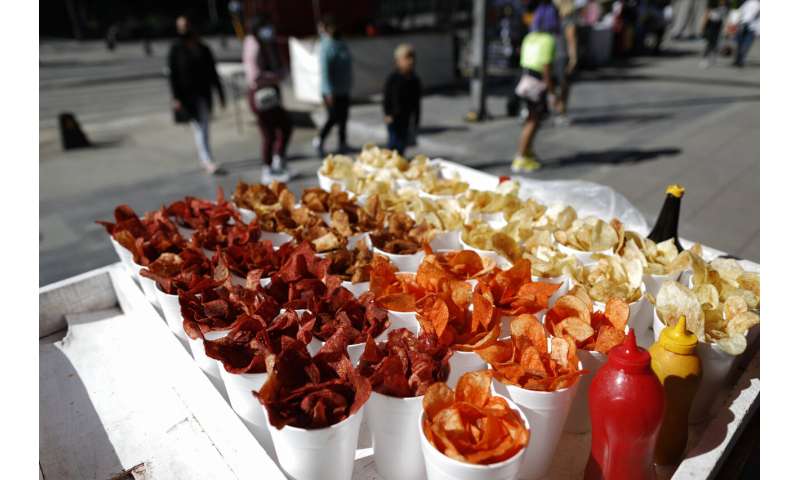
Snacks are displayed for sale in disposable cups, on the cart of a street vendor in central Mexico City, Friday, Jan. 1, 2021. The few street food vendors out working on New Year's Day amid the COVID-19 pandemic said they were either unaware of or were still figuring out how to comply with a broad ban on single-use containers, forks, straws, and other ubiquitous items that took effect Friday in Mexico's capital, one of the world's largest cities, after more than a year of preparation. (AP Photo/Rebecca Blackwell)
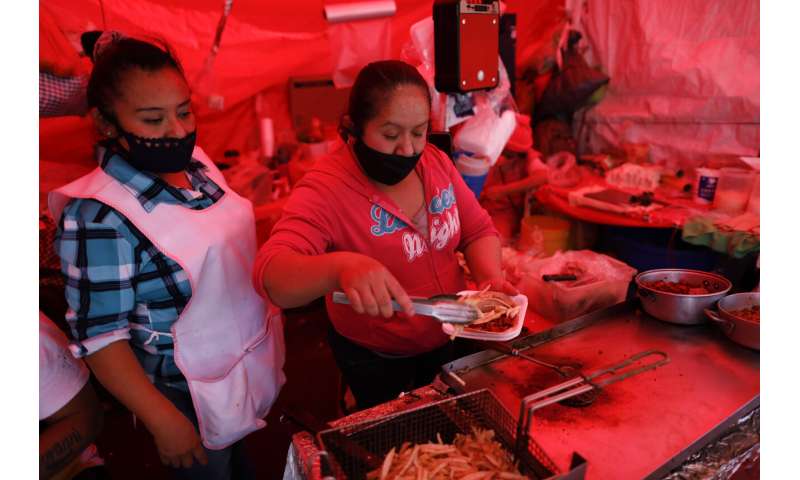
A vendor serves up tacos on disposable plates, at a street stand in central Mexico City, Friday, Jan. 1, 2021. The few street food vendors out working on New Year's Day amid the COVID-19 pandemic said they were either unaware of or were still figuring out how to comply with a broad ban on single-use containers, forks, straws, and other ubiquitous items that took effect Friday in Mexico's capital, one of the world's largest cities, after more than a year of preparation. (AP Photo/Rebecca Blackwell)
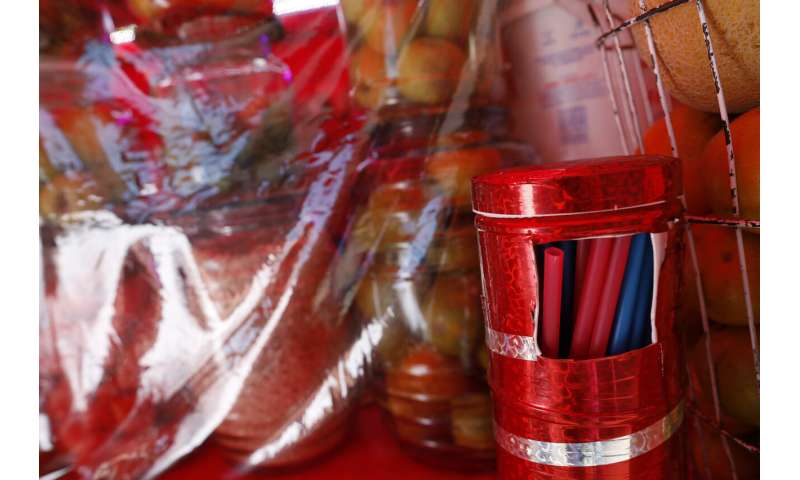
Plastic straws are offered for clients at a street juice stand in central Mexico City, Friday, Jan. 1, 2021. The few street food vendors out working on New Year's Day amid the COVID-19 pandemic said they were either unaware of or were still figuring out how to comply with a broad ban on single-use containers, forks, straws, and other ubiquitous items that took effect Friday in Mexico's capital, one of the world's largest cities, after more than a year of preparation. (AP Photo/Rebecca Blackwell)
Mexico City is currently under red alert as its hospitals' COVID-19 beds hover near capacity.
The woman, who declined to give her name because she didn't want to be singled out for enforcement, said it wasn't just her. She said vendors and market stalls were still using plastic all over the city.
She asked how she was supposed to give customers steaming hot tamales without a plastic bag.
The ban also covers disposable plastic cups, plastic stirrers, single-use coffee capsules and balloons among other items.
In 2019, Mexico City produced about 13,000 tons of garbage per day, according to the capital's environmental agency.
Explore further Canada to ban single-use plastics such as bags, straws by end of 2021
© 2021 The Associated Press. All rights reserved. This material may not be published, broadcast, rewritten or redistributed without permission.
24 shares
The woman, who declined to give her name because she didn't want to be singled out for enforcement, said it wasn't just her. She said vendors and market stalls were still using plastic all over the city.
She asked how she was supposed to give customers steaming hot tamales without a plastic bag.
The ban also covers disposable plastic cups, plastic stirrers, single-use coffee capsules and balloons among other items.
In 2019, Mexico City produced about 13,000 tons of garbage per day, according to the capital's environmental agency.
Explore further Canada to ban single-use plastics such as bags, straws by end of 2021
© 2021 The Associated Press. All rights reserved. This material may not be published, broadcast, rewritten or redistributed without permission.
24 shares
No comments:
Post a Comment